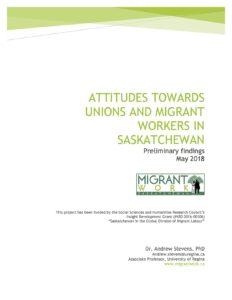These survey results are part of a broader project that examines migrant workers in Saskatchewan. The research has been funded by the Social Science and Humanities Research Council (SSHRC) and the Dean’s Research Award (University of Regina, Faculty of Business Administration) as part of a study, “Saskatchewan in the Global Division of Migrant Labour”. A full copy of the report can be downloaded here.
Fueled by economic development and global commodity prices, the province’s population growth over the last decade has been driven by immigration. Many of these newcomers entered Saskatchewan through a multitude of programs such as the Temporary Foreign Worker Program (TFWP), Saskatchewan Immigrant Nominee Program (SINP), the International Mobility Program (IMP), among others. International students enrolled at our post-secondary institutions also constitute an important – and growing – element of the newcomer population. Currently, around 20,000 migrant workers and permanent residents call Saskatchewan home. 
As permanent residents, temporary foreign workers, immigrants, and new Canadians, these newcomers staff our restaurants, work in our province’s mines, factories, and oil fields; they are engineers and construction workers; physicians, and nurses; they are professors and graduate students; they work in all three levels of government; they toil in our greenhouses and agricultural industry; they are nannies and live-in caregivers. But, most importantly for the purposes of this study, they are also union members. The study provides a snapshot of findings, and compares union attitudes amongst unionized non-Canadian, Canadian, and international student workers. These preliminary findings merit further investigation and are worth reflection when it comes to union policies, practices, and collective bargaining agendas in our increasingly diverse workplaces.
Methodology
Between December and June of 2017 social media, mail outs, email list-serves, and leafleting at public events were used to promote the on-line survey. The survey involved 46 branching questions focusing on the following themes: citizenship status; number of years working in Canada; country of origin; perspectives on foreign workers; opinions on unions; income; educational background; industry of employment; occupation; job satisfaction; working conditions; and level of engagement with the union. Promotional material was distributed to unionized workers through membership lists maintained by the International Brotherhood of Teamsters, Saskatchewan Building Trades, and the United Steelworkers in Saskatchewan. A total of 247 participants completed the survey; 130 of who were members of a union. Although the response rate is hardly representative of the Saskatchewan population or workforce, it offers important insights about union-migrant worker relations in the province.
Acknowledgements
A great deal of thanks is owed to my Research Coordinator, Farha Akhtar, as well as research assistants Nuoya (Noah) Li, and Leonzo Barreno. Without their contribution to the research design and execution this project would not have been possible. Funding has been provided by the Social Science and Humanities Research Council (SSHRC) and the Dean’s Research Award (University of Regina).
